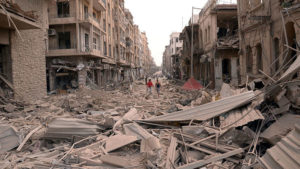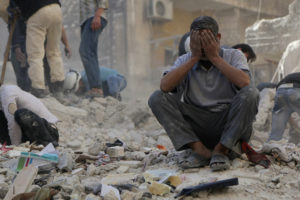“The blood of those hungry and desperate Syrians will rest on the heads of one man, ” Bashar Al Assad”. The civil war of syria shows no signs of healing, recovery and lasting peace. Praying for those people is the collective power we all can exercise. “
Displacement, misery and melancholy marks the Syrian story. It has been over five long years since armed conflict has pushed the Syrian people into hopelessness. Going by estimates, more than 2,50,000 people have lost their lives in Syria and over 11 million have been forced to leave their homes and seek asylum and refuge in neighboring Turkey and Europe. President Bashar al-Assad has not been very successful in combating the rebel groups and Jihadist militants. In the wake of this, the United Nations struggles to broker negotiations in the war-torn region.
Pro-democracy protests first originated in the month of March in 2011 after some young teenagers were tortured and arrested for having painted revolutionary slogans. Every war is a crime, and even if it is a civil war, it demands the blood of many. This protest triggered a nation-wide demand to oust Assad’s regime. Was this inspired by the Egyptian Uprising at Tahir square? Was it a revolution triggered by the historical icon Ernesto Che Guevara and Late Fidel Castro? Or was it a revolution that was meant to demand a more meaningful and honest Syrian life for its countrymen?
The answers to these questions do not matter anymore.
Families have been separated, peaceful relationships broken down, hatred, grief and a public health disaster surrounds the Syrian story. The conflict now remains a simple fight between those for Assad and those against him. But the rise of Jihadist groups has added different dimensions to this conflict. Having been divided between the Sunni majority and the Shia Alawite sect, the Syrian deadlock has attracted opportunistic world powers furthering their own self-interests towards writing a new world order.
From a public health point of view, the Syrian conflict is a water-shed moment. The migration crisis has posed a new public health challenge which international global health advocates should urgently discover solutions to. But certain regions in Damascus and Eastern Aleppo have rendered living conditions almost impossible, with food and water supplies getting cut and people dying out of hunger while health systems are on the brink of collapse.

Courtesy: Reuters

Recently a UN inquiry commission said that compelling evidence exist to prove that rapes, torture, trafficking, murder and forced disappearances have surrounded the war-torn country. Civilians have been targeted by blocking basic needs. UN estimates suggest that if 13.5 million people are to be assisted, $3.2 billion will be needed in aid. This will mean not only financial assistance from governments, but big philanthropists will be needed to put in place course correction in days to come.
Since the war zone shares similar space along with civilian establishments, about two million children have been forced out of school and four of five people live in poverty with over 70 % civilians not having access to clean and adequate drinking water and sanitation which runs the risk of disease outbreak. People suffering from chronic diseases, do not have access to their medicines. The psychological trauma that these families go through are enormous which will lead to sizable depression in coming years. Setting up field hospitals in conflict zone becomes highly unpredictable and difficult.
Often, it so happens that published data on deaths from war zones rely on press report of eye-witness account which are to some extent empirical in nature. Reviews cite figures from other reviews and dependency on surrogate information makes the validation process more grave. The current Syrian conflict has limited clarity on the availability of essential medicines and equipment, the required number of doctors on ground or at least at relief camps, the number of optimally functioning health systems with facilities like dialysis, intensive care and triage areas. Nutritional status and environmental issues including non-communicable disease are not very encouraging in the war-torn nation. Conflict will inevitably cause more loss of life, but the potential dangers of pregnant women and children will only be amplified in days to come. While immediate public health dangers exist due to population movement. Many diseases are emerging due to close contacts with patients having underlying diseases in temporary shelters.
The problem will further be compounded in the long run with monitoring of disease and public health surveillance getting disrupted, which in turn will lead to higher levels of illness and increase mortality rate. While we recognize this, the public health professionals remain uniquely qualified to negotiate war and address basic epidemiological skills to identify risk and protective factors, plan and monitor the policies in place and intervene through turn-key diplomacy. The Syrian war, the way I see it, should engage more public health professionals among international and inter-country organizations who will serve as a common ground to form an alliance for other disciplines to talk and work in unison for civilian good. The state of the Syrian union is weak.
( Disclaimer: This article was first written by the author in 2016. Few details might be irrelevant now, though extreme care is taken to ensure the right message, positioning and reality is put forth)